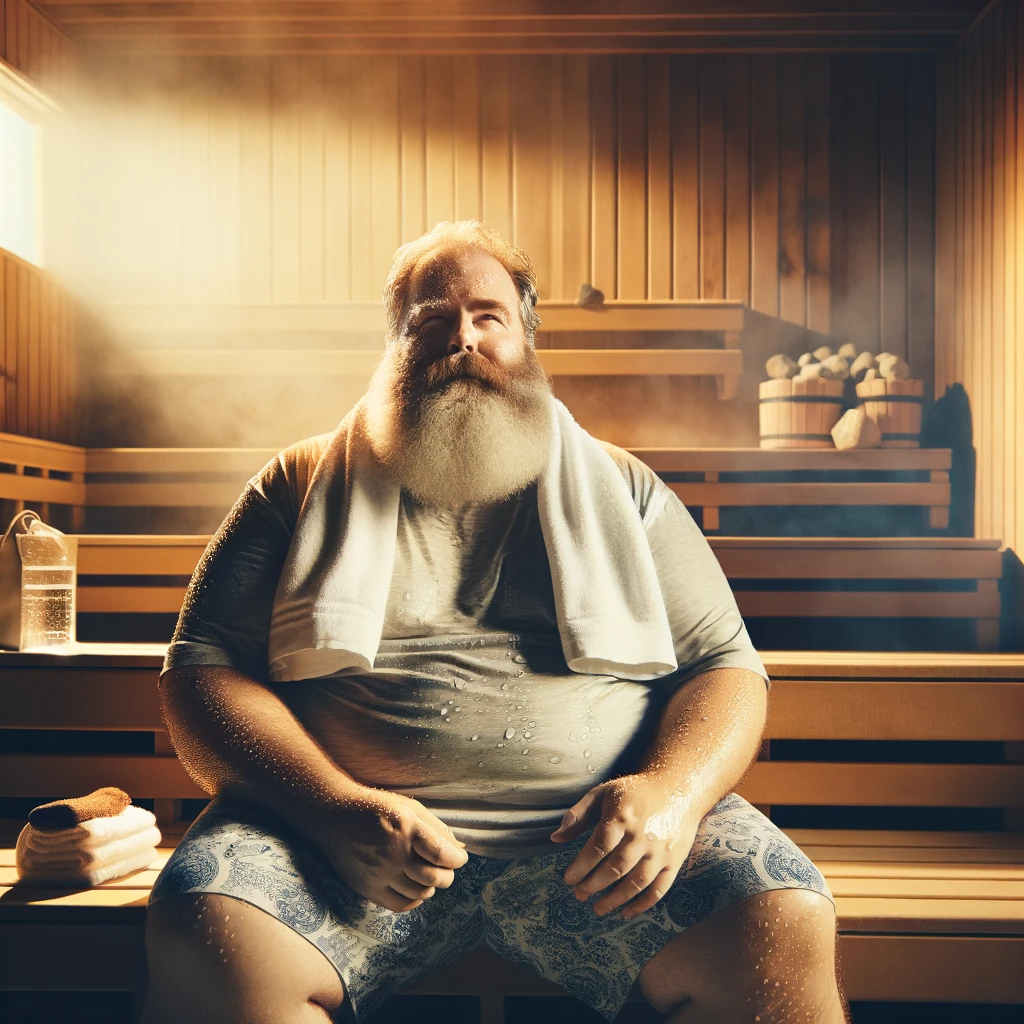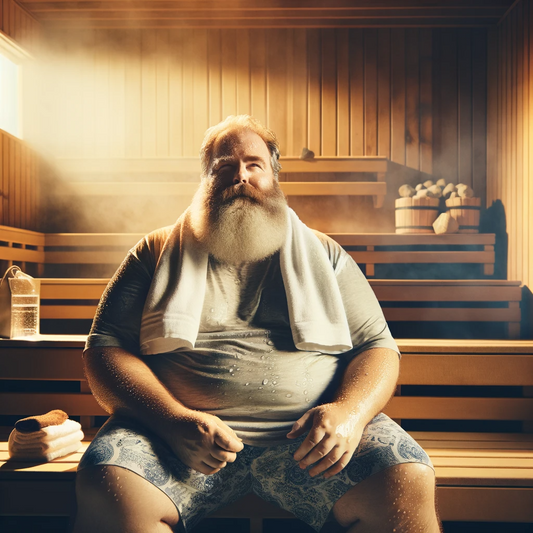Sauna bathing, a practice rooted in tradition, transcends mere relaxation. Originating from the serene landscapes of Finland over 2,000 years ago, sauna bathing has woven itself into the fabric of wellness practices around the globe. As individuals step into the warm embrace of the sauna, they seek not only a refuge of tranquility but a haven for holistic wellness.
Can Sauna Bathing Help Me Lose Weight?
The short answer is yes! But the long answer is that it's complicated. As you may have guessed by now, saunas induce profuse sweating and sweating does lead to weight loss. That said, it's most water weight that you're losing, which means you're not magically burning fat so much as it is expelling water through the skin in the form of sweat. That's the easy answer, but to better understand all the scientific effects of sauna bathing and sweating on weight loss, we'll need to dig deeper.
The allure of shedding some pounds while basking in the soothing heat has sparked a journey of scientific exploration. The scientific community has embarked on unearthing the mechanisms through which sauna bathing can be a companion in one's weight loss journey. The gentle hum of the sauna promises more than just a serene escape, but a pathway to a lighter, healthier self.
The Science of Weight Loss from Sauna Bathing
The quest for weight loss often navigates through the realms of diet, exercise, supplements, sleep and now, sauna bathing. Actually, studies on the benefits of sauna bathing and weight loss have been taking place for years. Unlike the sweat produced from physical exertion, the sweat from a sauna session is not just about water loss; it's a gateway to a realm of metabolic and physiological changes conducive to fat burning and weight loss.
First a primer (or perhaps reminder) to keep in mind as you learn more about this sauna-backing science of weight loss. If you’re weight conscious, tracking food or exercise, or always reading nutrition labels, you probably think in terms of calories. Ahh yes, the dreaded calorie. But just what is a calorie, anyway? It’s actually a unit of energy. 1 calorie is the amount of energy needed to raise the temperature of 1 gram of water by 1º C. Why am I telling you this? Check out the science unwrapped below to see why:
Thermogenic Effect:
Thermo-what? Thermogenesis is the scientific term for heat production in organisms, primarily warm-blooded animals. In order to heat up the body, you’ll need to burn calories. And since saunas operate by generating heat, which in turn warms the body, this triggers a thermogenic effect, where the body works to cool itself down. This cooling also requires energy, which is sourced from the calories stored in the body, leading to calorie burn and potential weight loss.
Increased Metabolic Rate:
The heart rate increases during a sauna session, similar to the effect observed during moderate exercise. This increase in heart rate can boost the metabolic rate, and when your heart is beating faster, it needs energy to fuel the circulation of blood. This is another source of the body burning calories during sauna bathing.
A study found on Mayo Clinic Proceedings shows that regular sauna bathing might elevate the resting metabolic rate (RMR), assisting your weight loss.
Side Tip: If you’re not familiar, the term resting metabolic rate (RMR), this is the number of calories required by your specific body to support basic physiological needs like breathing, circulating blood, organ functions, and basic brain functions. This is not to be confused with basal metabolic rate (BMR) which is similar but different from RMR.
Enhanced Lipolysis:
Lipolysis is a critical biochemical pathway (a series of chemical reactions in your body) that is essentially the body's way of breaking down stored lipids into free fatty acids and glycerol which are then available for energy utilization. The breakdown and thus release of these fatty acids are a cornerstone to fat reduction, making lipolysis a particularly of interest for people aiming to lose weight. While sauna bathing, the body experiences heat stress, a trigger that has been shown to stimulate lipolysis. The sauna's heat stress encourages the body to tap into its stored fat reserves for energy, to cope with the increased demand for energy to cool down the body.
The enhanced circulation and cardiovascular activity during a sauna session can further facilitate the utilization of these fatty acids, rendering sauna bathing a potent catalyst for lipolysis and therefore fat loss. By unlocking the pathway, sauna bathing may offer a practical addition to conventional weight loss strategies. The potential of sauna bathing to stimulate lipolysis can contribute to modern health goals, making it not just a sanctuary of relaxation, but a haven for those on a weight loss journey.
Growth Hormone Secretion:
Growth Hormone (GH) is a pivotal hormone that plays a crucial role in numerous physiological processes including cell growth, metabolism, and homeostasis. While experiencing the intense heat of a sauna, your body responds to this thermal stress by increasing the release of growth hormone. The surge is a gateway to enhanced lipolysis and fat metabolism.
Growth hormone stimulates lipolysis, the breakdown of adipose tissue (fat) into free fatty acids which are then ushered into the bloodstream (which we already covered above). Once in circulation, these fatty acids become available for oxidation, so they can be "burned" to meet the body's energy demands. GH also fosters a favorable metabolic situation by promoting muscle protein synthesis and lean muscle mass. A higher muscle mass is synonymous with a higher basal metabolic rate (BMR), meaning you burn more calories even at rest.
In other words, growth hormone does not just help you burn off calories, it helps promote muscle protein synthesis and build bigger and stronger muscles! 💪 When seen through the lens of growth hormone secretion, sauna bathing emerges as way more than a passive wellness practice, but an active player in the narrative of fat loss and body composition management.
Improved Insulin Sensitivity:
If you are or know someone who is diabetic, then I would venture to bet you’ve heard an earful about insulin and how critical it is to weight management. Insulin is a hormone vital for glucose uptake and metabolism. Enhanced insulin sensitivity ensures that glucose is efficiently utilized for energy (or stored), thereby maintaining blood sugar levels within a healthy range. On the contrary, reduced insulin sensitivity, often termed insulin resistance, can lead to elevated blood sugar levels, promoting fat storage and setting the stage for metabolic disorders like obesity and type 2 diabetes. Sauna bathing has emerged as a potential ally in improving insulin sensitivity due to its ability to induce certain physiological changes conducive to better metabolic health.
Regular sauna use can lead to significant improvements in glucose metabolism and insulin sensitivity. This is very important for weight management, as improved insulin sensitivity allows for better glucose and fat metabolism, making it easier to shed those unwanted pounds. By fostering a more insulin-sensitive environment, sauna bathing may help create a metabolic environment favorable to weight loss.
Heat Shock Proteins (HSPs):
Heat Shock Proteins (HSPs) are a family of proteins produced in response to stressful conditions, including exposure to heat. These proteins help cells cope with stress and ensure cellular function is maintained during adverse conditions. Unsurprisingly, HSPs are a hallmark of sauna bathing, given the thermal stress it imposes on the body. As you soak in the warmth of a sauna, your body orchestrates a symphony of cellular responses, with the synthesis of HSPs being a key note.
HSPs also pertain to metabolic regulation and obesity management. Studies have shown that HSPs can enhance fatty acid oxidation, improve insulin sensitivity, and mitigate inflammation (all covered here in this article) — which are crucial for effective fat metabolism and weight management. By fostering fat burning and metabolic efficiency, HSPs may play a vital role as to how sauna bathing contributes to weight loss. Not to mention, the anti-inflammatory properties of HSPs may counter metabolic inflammation, which is often associated with obesity and metabolic disorders.
Reduced Inflammation:
Inflammation, particularly chronic low-grade inflammation, is another significant player around the discussion of metabolic health and weight management. This type of inflammation is often associated with obesity and metabolic disorders, creating a vicious cycle where inflammation promotes fat accumulation, which in turn exacerbates inflammation. Inflammation can impair insulin sensitivity, hinder lipolysis (the breakdown of fat), and promote fat storage, thus acting as a barrier to weight loss that we cannot ignore. The heat stress from sauna bathing triggers an anti-inflammatory response, which may include the induction of heat shock proteins and the enhancement of antioxidant defenses.
It’s important to note that the relaxation and stress reduction you get with sauna bathing can also further contribute to reduced inflammation, as stress is a known promoter of inflammatory responses.
Water Weight Loss:
Yes, the initial weight loss observed post-sauna session is often water weight due to sweating, but the metabolic changes induced by the heat stress may contribute to long-term weight loss when combined with a healthy diet and exercise regimen.
Are you convinced yet? We’ve provided 8 different explanations above about how the gentle heat of the sauna sets the stage for potential weight loss. As you can see, they all work together in synergy in order to produce the desired effects. While the sweat droplets carry away the immediate water weight, the cascade of internal activities may carry the promise of a lighter tomorrow.
6 Tips for Improving Fat Loss with Saunas
- First and foremost, before you start using sauna for fat loss or any other reason, you should consult with your doctor. Regular sauna use is NOT for everyone so it would be important to find out you have any medical concerns that make saunas unsafe.
- If you're like me, I don't just do something a little bit. I go ALL IN and I try to do it my best or in the most optimal way. However, if you're new to sauna bathing, please start with short sessions and ease your way into it. Start with sessions that are 10 minutes or less to get familiar with the feeling and allow your body to adjust. Then gradually increase your sauna sessions a little bit at a time, until you work your way up to 30 minutes. Most commonly a sauna bath is typically 15-30 minutes at a time.
- Stay hydrated! You'll need to drink plenty of water after your sauna bath, but ideally before and during your sauna bath as well. Do NOT drink alcohol before or during your sauna session. Since you'll be sweating like a pig in there, you'll be losing a lot of your body's essential water, so you want to make sure you stay hydrated to avoid serious health concerns. One way you can help to stay hydrated is to have some electrolytes on hand. This could be a powder you put into water, or certain types of drinks like Gatorade (though I don't prefer those, as they typically come full of sugar).
- Saunas work best when you pair regular sauna bathing with exercise. While there is some debate amongst sauna enthusiasts about whether you should hit the sauna before or after your workout, I prefer the sauna after my workout. Saunas help you with blood circulation, which promotes getting much-needed oxygen throughout the body, especially to your sore and tired muscles after a workout. Going to the sauna before your work out could deplete your energy and zap you before you even got your reps in!
- Saunas ALSO work best when you have a healthy balanced diet. It's not required, but if you are trying to optimize and get on the bio hacking train, then eating a proper diet is essential. Do your best to avoid highly processed foods and instead aim for whole foods comprised mainly of colorful vegetables, healthy animal proteins (if you're a meat eater) and whole grains.
-
Staying safe in the sauna is key. Here are a few ways you can do this:
- Be mindful and hyper aware of how you're feeling! If you start to feel dizzy or light-headed, get out immediately!
- Put your sauna heater on a timer. This will help in case you pass out inside due to heat exhaustion (hopefully not!)
- Use a timer inside the sauna. There are not many sauna clocks since most cannot handle the heat and moisture, but you can find a sauna sand timer, which will help you time your stay to 15 - 30 minutes.
- Let others know you're headed into the sauna. Hopefully you are either in the sauna with your spouse or friend, or let them know you're headed into the sauna and how long you plan to stay.
- Drink plenty of water!
Other Common Questions about Saunas and Weight Loss
Q: How much weight can you lose in a sauna?
If I may be blunt: this is NOT the right question to ask. While yes, you can lose 1 - 2 lbs in a sauna session, remember what we discussed above: that weight is largely a loss of water through excessive sweating. As soon as you start hydrating again, that could all come back.
That said, regular sauna use over an extended period of time can help boost physiological factors that lead to better weight loss like increased metabolism, faster recovery from exercise, increased oxygen in the blood stream, improved circulation, a higher resting metabolic rate, and a lot more.
I know it's hard but try not to think about the short term affects on the scale, and more about the positive correlation to your overall health with a your new habit of sauna bathing.
Q: Does the sauna increase metabolism?
Yes, the sauna can increase your metabolism. On the short term scale, it will be a temporary increase in metabolism while your body responds to the heat and sweating. Your heart rate will increase which then gets your body working hard and burning more calories in the sauna. But this exact effect is temporary.
Over time, regular sauna use can improve and elevate your resting metabolic rate (RMR), which is the amount of calories (energy) needed to just go about your normal day.
Q: How long to stay in the sauna for weight loss?
Generally sauna sessions should only be 15 - 30 minutes at most. If you're new to the sauna, we strongly recommend you start with 5 - 10 minute sessions, and then increase them by 5 minutes over time until you are comfortable staying up to 30 minutes.
You may hear or read about people spending 60+ minutes in a sauna session, but I don't recommend this unless you've spent considerable time in the sauna over years, you know what you're doing, and you've consulted a doctor.
Q: When is the best time to use a sauna for weight loss?
This is mostly a matter of preference. My preference is to do it at one of two times (sometimes both): in the morning upon waking up, which is when your body temperature is at its lowest temp throughout the day. This may allow your body to handle the high temps a little bit easier.
The other times I like to use the sauna is after my workout. Given all the things that happen physiologically in your body while in the sauna, it definitely helps speed up recovery, increase flow of blood (and therefore oxygen) to your sore and tired muscles. This is one of the reasons that its great post-workout.




